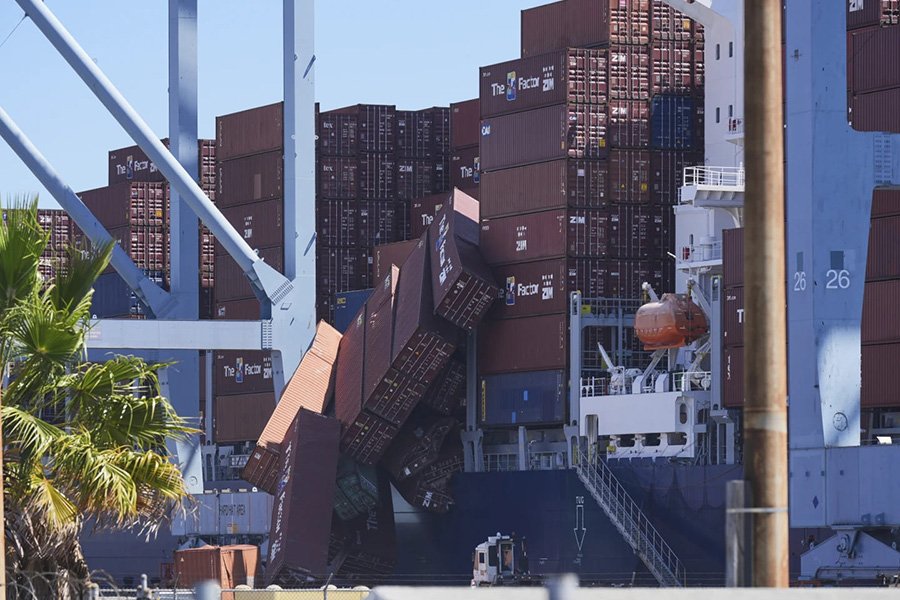
Freight News
Lessons Learned From Long Beach Container Spill

When dozens of shipping containers fell from a cargo vessel at the Port of Long Beach on September 10, 2025, it was more than a local news story—it was a sudden, real-world stress test for the global supply chain. The incident at the Pier G terminal immediately highlighted the vulnerabilities that can impact any business relying on international trade, offering crucial lessons in risk and preparedness.
The Vessel
The ship involved in the incident is the “Mississippi,” a 5,504 TEU (twenty-foot equivalent unit) vessel that sails under the Portuguese flag. The ship is owned by MPC Container Ships and is on charter to ZIM. The Mississippi had recently arrived in Long Beach from the Yantian port in Shenzhen, China, having departed on August 26.
The Incident
According to a statement from the port, dozens of containers fell from the vessel Mississippi just before 9 a.m. while it was berthed at the Pier G container terminal. The collapse appears to have occurred in two separate locations on the vessel: one stack of containers fell onto “STAX 2”, a clean air barge moored alongside the ship, while another collapsed at the stern. Hours after the initial shipping containers fell, even more containers toppled on the port side.
67 containers were initially announced lost, later rising to about 75 according to subsequent reports. Retailers throughout the US may have lost their goods in the mishap, with spilled content ranging from shoes to clothing to electronics. According to port officials, sonar surveys are being conducted to locate approximately 25 to 30 containers submerged in the harbor to ensure the safe navigation of ship traffic.
While thankfully no injuries were reported, the affected terminal temporarily suspended cargo operations to manage the situation and ensure safety. A 500-yard safety zone was established around the vessel, and recovery efforts for the submerged and floating containers began.
Impact
While an incident of this scale is not a daily occurrence, it highlights the vulnerabilities that exist in the global supply chain. It is therefore important for us to understand the potential ripple effects such an event can have:
- Cargo Delays: The immediate suspension of operations at the affected pier means delays for any cargo scheduled to be loaded or unloaded from that terminal. This can disrupt production schedules and delivery commitments.
- Port Congestion: A disruption at one terminal can lead to increased congestion at other terminals within the same port and even at neighboring ports as vessels are rerouted.
- Financial Implications: Delays can lead to additional costs such as demurrage and detention Furthermore, for businesses with uninsured cargo in one of the lost containers, the financial loss can be significant.
Freight Forwarding
In the face of such unpredictability, a freight forwarder is more than just a booking agent; we are your strategic partner in mitigating risk and ensuring your cargo’s journey is as smooth as possible. Here’s how we make a difference:
- Proactive Monitoring and Communication: Our team constantly monitors global events that could impact your shipments. In situations like the Long Beach spill, we would immediately identify any client cargo on the affected vessel or at the terminal and provide timely, transparent updates.
- Risk Mitigation Strategies: We work with you to build a resilient supply chain. This includes advising on the importance of cargo insurance to protect your investment and exploring alternative routing options to avoid potential choke points.
- Strong Carrier Relationships: Our established relationships with a wide network of ocean carriers and terminal operators allow us to navigate disruptions effectively. Whether the best solution involves air freight or sea freight, our partnerships to find alternative solutions and advocate on your behalf.
- Expert Guidance: Understanding the complexities of international shipping is our core business. We provide the expertise you need for a smooth customs clearance process, as well as specific knowledge for key lanes like Singapore and Vietnam. By working with us, you can ensure that your cargo is compliant, properly documented, and handled with care.
Conclusion
The incident at the Port of Long Beach is a powerful illustration of why a hands-off approach to logistics can be risky. In a world of complex and sometimes volatile supply chains, having a dedicated partner to manage the intricacies of freight forwarding is not a luxury—it’s a necessity.
For nearly two decades, Express Freight Management has been the trusted partner for businesses shipping between the United States and Southeast Asia. We handle the technological complexity for you, managing everything from carrier selection and customs clearance to warehousing. Discover a streamlined approach to logistics with Express Freight Management for your shipping needs between the United States and Brunei, Cambodia, Indonesia, Laos, Malaysia, Myanmar, Philippines, Singapore, Thailand, and Vietnam today!
